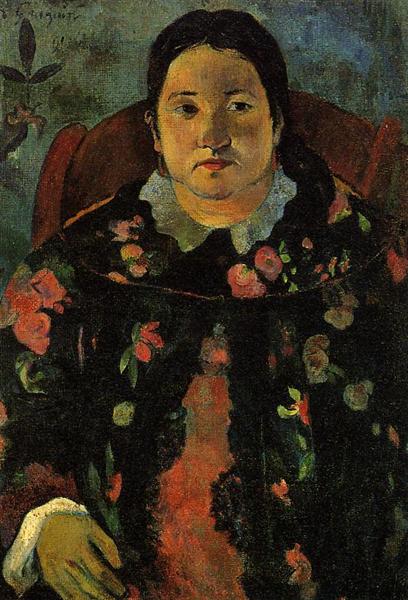Popis
Portrait of Suzanne Bambridge, painted by Paul Gauguin in 1891, is a work that encapsulates the essence of the artist and his constant search for a new pictorial expression. Not only delving into portraiture as a genre but also reflecting the influence of symbolism and post-impressionism, this painting reveals a complex combination of colour, form and emotion.
In this work, the central figure, Suzanne Bambridge, strikes a remarkably introspective pose. Her eyes, intense and fixed, seem to pierce the pictorial surface in a silent dialogue with the viewer. This focus on the direct expression of the subject is characteristic of Gauguin, who strove to portray not only the physical appearance of his sitters, but also their emotional and psychological state. Through her penetrating gaze, Bambridge evokes a sense of introspection that invites the viewer into a deeper connection with the essence of the person portrayed.
The fragmented composition and distribution of space in the painting are noteworthy. The figure is placed in the foreground, drawing attention to her face and upper body, while the background is less detailed and more suggestive. This creates a contrast that highlights the figure against a background of softer, less defined tones. The definition of the contours of the face and hands is done with strokes that are both firm and fluid, showing Gauguin's ability to unite shapes and colors in a gentle balance.
The use of colour is also extraordinary in this work. Gauguin opts for a palette composed mainly of warm tones, where the use of yellow and red prevails, while blue and green tones act as a counterpoint that gives life to the composition. This expressive use of colour not only structures the work, but also infuses it with an energy that can be interpreted as a reflection of the spirit of the times, an echo of the changes that were coming towards modernity.
In art history, Gauguin is renowned for his ability to intertwine the representational with the symbolic, creating a distinctive style that departs from the conventions of his time. “Portrait of Suzanne Bambridge” is not only a representation of the woman who was the artist’s friend and model, but also fits into a broader dialogue about identity, aesthetic quest and symbolism that characterized his work at this stage of his career.
Although the portrait is notable for its individual approach, it can also be seen as part of a series of works in which Gauguin explored female representation. In his other paintings, such as “La Belle Annette” or “The Spirit of Painting,” he also employed a similar approach that combines emotional symbolism with the representation of the female figure, reaffirming his continuing interest in the interrelationship between the subject and its context.
“Portrait of Suzanne Bambridge” reflects the distinctive style of Gauguin, whose work has interacted with a variety of artistic currents and whose influence can be felt in the works of many contemporary artists. Through his dedication to capturing the essence of the human being, the painting becomes a testament to his mastery and his innovative vision of portraiture, in which technique and emotion intertwine to give life to the image of a woman who, in a moment of stillness and reflection, leaves a lasting imprint on art history.
KUADROS ©, a famous painting on your wall.
Hand-made oil painting reproductions, with the quality of professional artists and the distinctive seal of KUADROS ©.
Painting reproduction service with satisfaction guarantee. If you are not completely satisfied with the replica of your painting, we will refund 100% of your money.

